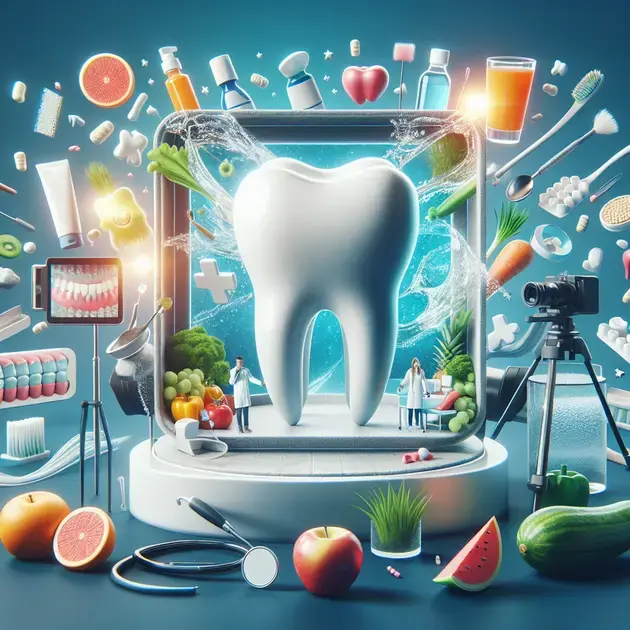Proper dental care is essential for maintaining good oral health and preventing dental problems. By following top tips for proper dental care, you can ensure that your teeth and gums remain healthy and strong. Regular brushing, flossing, and dental check-ups are key aspects of a good oral hygiene routine.
In addition to routine dental care practices, it is also important to pay attention to your diet and lifestyle choices. Avoiding sugary foods and drinks, quitting smoking, and staying hydrated can all contribute to better oral health. Remember, prevention is always better than cure when it comes to dental issues.
Implementing a Consistent Oral Hygiene Routine
Establishing a consistent oral hygiene routine is essential for maintaining healthy teeth and gums. Start by brushing your teeth at least twice a day with a fluoride toothpaste. Use a soft-bristled toothbrush and gentle, circular motions to clean all surfaces of your teeth. Flossing daily is also crucial to remove plaque and food particles from between the teeth. Consider using a water flosser in addition to traditional flossing for a thorough clean. To ensure you are brushing and flossing effectively, you can download the mobile app “Brush DJ,” which plays music for two minutes (the recommended brushing time) while you clean your teeth.
Another important aspect of oral hygiene is regular visits to the dentist for professional cleanings and check-ups. Dentists recommend scheduling a check-up every six months to detect any potential issues early. You can use the website “Zocdoc” to find and book dental appointments conveniently online. Additionally, consider incorporating mouthwash into your routine for added protection against bacteria and bad breath.
It’s also important to replace your toothbrush every three to four months or sooner if the bristles are frayed. Store your toothbrush in an upright position and allow it to air dry between uses to prevent bacterial growth. By following these steps and being consistent with your oral hygiene routine, you can help prevent cavities, gum disease, and other dental problems.
Making Healthy Diet and Lifestyle Choices
Your diet and lifestyle choices play a significant role in your dental health. To promote strong teeth and gums, focus on consuming a balanced diet rich in fruits, vegetables, lean proteins, and dairy products. Limit your intake of sugary snacks and drinks, as sugar can contribute to tooth decay. Drinking plenty of water throughout the day can also help wash away food particles and bacteria that can lead to oral issues.
Avoid habits like smoking and excessive alcohol consumption, as they can negatively impact your oral health. Instead, prioritize habits that support overall well-being, such as regular exercise and stress management. The app “MyFitnessPal” can help you track your food intake and exercise, making it easier to maintain a healthy lifestyle. Additionally, consider incorporating calcium supplements into your diet to support strong teeth and bones.
Snacking on crunchy fruits and vegetables like apples and carrots can help naturally clean your teeth and stimulate saliva production, which aids in protecting your teeth against decay. By making mindful choices in your diet and lifestyle, you can promote not only a healthy smile but also overall wellness.
Embracing Preventive Measures for Dental Wellness
Preventive measures are key to maintaining optimal dental wellness and preventing oral health issues. One important aspect of prevention is wearing a mouthguard during sports and other activities that pose a risk of dental injury. Custom-fitted mouthguards can be obtained through your dentist, who may use the app “Dental Mouthguard Lab” to create a personalized mouthguard for you.
Another preventive measure is the application of dental sealants, which are thin protective coatings applied to the chewing surfaces of molars to prevent cavities. Your dentist can assess your risk for cavities and recommend sealants as needed. Regular use of fluoride toothpaste and mouthwash containing fluoride can also strengthen tooth enamel and protect against decay.
In addition to in-office preventive treatments, practicing good habits at home such as avoiding chewing on hard objects like ice and using a mouthguard at night if you grind your teeth can further safeguard your dental health. By embracing these preventive measures and staying proactive in your oral care, you can enjoy a healthy smile for years to come.
How to Maintain Optimal Oral Health
Ensuring optimal oral health is crucial for overall well-being. It involves a combination of proper dental care practices and healthy lifestyle choices. Here is a step-by-step guide on how to maintain optimal oral health:
1. Brushing and Flossing Daily
Regular brushing and flossing are essential for removing plaque and food particles that can lead to cavities and gum disease. Use a soft-bristled toothbrush and fluoride toothpaste to brush your teeth twice a day. Flossing should be done at least once a day to clean between the teeth and along the gumline.
2. Eating a Balanced Diet
The foods you eat can impact your oral health. Include plenty of fruits and vegetables in your diet, as well as foods rich in calcium and Vitamin C. Limit sugary and acidic foods and beverages, as they can contribute to tooth decay and erosion.
3. Regular Dental Check-ups
Visit your dentist for regular check-ups and professional cleanings. These appointments allow your dentist to detect any oral issues early and provide appropriate treatment. Depending on your oral health status, your dentist may recommend visits every six months or more frequently.
4. Avoid Tobacco Products
Smoking and using other tobacco products can have a detrimental effect on your oral health. They can stain your teeth, cause bad breath, and increase your risk of gum disease and oral cancer. Quitting tobacco can improve both your oral health and overall health.
5. Stay Hydrated
Drinking an adequate amount of water is essential for saliva production, which helps in washing away food particles and bacteria in the mouth. Opt for water over sugary drinks, as water is the best choice for your oral health.
The Importance of Regular Dental Check-ups
Scheduling regular dental check-ups is a critical aspect of maintaining good oral health. These visits allow your dentist to assess your oral health status, detect any issues early, and provide appropriate treatment. Here’s why regular dental check-ups are important:
1. Early Detection of Issues
During a dental check-up, your dentist will examine your teeth, gums, and oral tissues for any signs of decay, gum disease, or other oral health issues. Early detection allows for timely intervention and prevents the progression of problems.
2. Professional Cleanings
Professional cleanings performed during dental check-ups help remove plaque and tartar buildup that cannot be effectively removed with regular brushing and flossing. This preventive measure reduces the risk of cavities and gum disease.
3. Customized Treatment Plans
Your dentist will create a personalized treatment plan based on your oral health needs and concerns. This may include recommendations for improving your oral hygiene routine, addressing existing dental issues, or considering additional treatments for optimal oral health.
4. Oral Cancer Screening
Regular dental check-ups often include an oral cancer screening. Early detection of oral cancer is crucial for successful treatment. Your dentist will examine your mouth, throat, and neck for any suspicious signs and recommend further evaluation if needed.
5. Preventative Care Advice
During your dental check-up, your dentist will provide guidance on maintaining good oral health at home. This may include tips on effective brushing and flossing techniques, dietary recommendations, and lifestyle habits that can benefit your oral health.
Tips for Effective Brushing and Flossing
Proper brushing and flossing techniques are key to maintaining optimal oral health. Here are some tips to help you effectively brush and floss your teeth:
1. Brushing Technique
Hold your toothbrush at a 45-degree angle to the gums and use gentle, circular motions to clean the outer and inner surfaces of your teeth. Don’t forget to brush your tongue to remove bacteria and freshen your breath.
2. Flossing Method
Use about 18 inches of floss and gently guide it between your teeth using a back-and-forth motion. Curve the floss around each tooth in a C shape to clean the sides thoroughly. Be careful not to snap the floss against your gums, as this can cause irritation.
3. Timing and Frequency
Brush your teeth for at least two minutes each time, ensuring you reach every tooth surface. It’s recommended to brush in the morning and before bed. Flossing should be done at least once a day, preferably before brushing at night.
4. Use the Right Tools
Choose a toothbrush with soft bristles and replace it every three to four months or sooner if the bristles are frayed. Consider using an electric toothbrush for more effective plaque removal. Use a flossing tool that works best for you, such as traditional floss, floss picks, or water flossers.
5. Regularly Change Your Technique
It’s essential to switch up your brushing and flossing technique to ensure that you are effectively cleaning all areas of your mouth. Pay attention to any areas that may be prone to plaque buildup or sensitivity and adjust your technique accordingly.
Conclusion
Optimal oral health is a vital component of overall well-being, requiring a combination of proper dental care practices and healthy lifestyle choices. By following a step-by-step guide that includes daily brushing and flossing, maintaining a balanced diet, scheduling regular dental check-ups, avoiding tobacco products, and staying hydrated, individuals can significantly improve their oral health.
Regular dental check-ups play a crucial role in detecting issues early, providing professional cleanings to reduce the risk of cavities and gum disease, and creating personalized treatment plans tailored to individual needs. These visits also include oral cancer screenings and preventative care advice, ensuring comprehensive oral health care.
Effective brushing and flossing techniques are essential for optimal oral health, with recommendations such as using the right tools, brushing for at least two minutes, and flossing daily to clean between teeth thoroughly. By incorporating these tips into a daily oral hygiene routine and making regular dental check-ups a priority, individuals can enhance their oral health and overall well-being.

